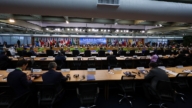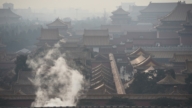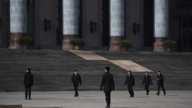【新唐人2013年03月06日讯】中共总理温家宝卸任前击出重拳,推出五项抑制房价政策的“国五条”,力道之重,造成中国股市全面重挫。群众责怪温家宝10年总理任内,“房价越调越高”,“政策不出中南海”。“国五条”是否又是“空调一场”﹖请看本台记者的报导。
国务院3月1号公布“国五条”的施行细则,其中包括扩大房屋限购范围,提升房价涨太快城市的自备款额度与贷款利率;以及民众出售自有住房所获利润,要课征百分之廿的个人所得税。
“国五条”影响中国股市重挫,各类股几乎全面下跌。
据报导,地产股3月4号在利空下重挫7%以上,共有49档地产股跌停,沪指放量大跌3.65%,创近19个月最大单日跌幅;深成指也大跌5.29%。
另一方面,北京、上海房地产交易中心和税务局大排长龙,民众赶在新政实施前办理过户,担心会被课到高额的所得税,或被卖方转嫁课税成本。
中共当局早在2003年就提出了6条调控房地产的措施,2005年又制定了“国八条”,2006年再制定“国六条”。但是,房地产价格的调控仍不见成效?群众责怪当局“房价越调越高,政策不出中南海”。温家宝去年此时向记者表示:他听到民众的指责声“感到十分痛心”。
旅美经济学博士谢田:“也不排除他在离职之前,做最后的一次……作秀也好、挣扎也好、或者是最后出击一拳也好,不排除他为个人的政治资本加码的动机。因为我们也知道,以前他有足够的时间可以让房价真正降下来。我估计这个政策肯定是短命的!中国的房价还是不会下来,这房地产市场的基本格局应该不会有什么改变。”
北京《国情内参》首席研究员巩胜利﹕“比如对房地产的买卖收税达百分之二十,不知道他怎么样执行﹖买第一套房的一般的都是手头比较宽的时候买了,结果你想买第二套比较宽大的房子的时候,第二套房的政策比较严格的限制,要付出高昂的费用。”
有媒体报导说,对于温家宝10年总理任内,房价愈调愈高的质疑,甚至责难,不曾间断,许多人甚至说他任内的调控完全是“空调”,白折腾一场。
旅美经济学博士谢田表示,中共推出的那些调控房地产措施,都没有触及房地产最根本的问题。他提醒中国大陆民众,中国的房地产市场只是一个租赁市场,民众购买的只有使用权,不是产权,因此,不要被共产党制造的房市假象欺骗了。
谢田:“中国只有一个租借市场,中国人买房子都是买70年的使用权,我不知道为什么那么多人忘掉了这一点,好像他在购买房子,他没有购买房子,他没有产权,他只是在那儿向政府租借,并且付的租金远远高于其他国家,甚至发达国家,如美国房地产购买的价格。所以中国整个房地产市场,基本上就是一个荒唐的笑话。”
据谢田介绍,美国联邦政府拿不到地方的房地产税收,联邦政府一般有公民的所得税收入。而美国的地方政府多把房地产税收用在学校教育或警察治安方面。谢田认为,中共的管理体系已经崩溃,不存在经济秩序,目前中国地方的各级政府都想从房地产捞一笔。
巩胜利:“今年的一、二月份,北京市卖的房地产的土地,已经超过去年的一半,就一、二月份,就是说,还在大量的卖土地,用土地收入来支撑政府的财政。既然卖土地,招标的土地就越高,当然政府越高兴,那么,老百姓买房子的价格就越高,这是必然的一种结果。”
虽然中国“人亡政息”是常见的现象,不过,按照中共官场的惯例,不久后接任国务院总理的李克强,初期还是会“萧规曹随”,继续执行温家宝强加给他的“国五条”。
采访/刘惠 编辑/周平 后制/钟元
Wen’s New Policies: Heavy Blow to the Stock Market
China’s Premier Wen Jiabao launched prior to his departure
“State-Five Policies” for curbing housing prices.
This is like a heavy blow and has caused
stock markets in China to fall.
People criticize Wen for failing to implement his policies
to curb housing price in his 10-year tenure.
Will these “State-Five Policies”
be in vain again?
The State Council released on March 1,
implementation details of the “State-Five Policies.”
They include restrictions on large houses, stipend and
lending rates for cities with housing price going up too fast, 20% tax for profits earned by selling own houses, etc.
The “State-Five Policies” is like a heavy blow
to stock markets in China, causing stocks to fall.
Accordingly, real estate stocks fell over 7%.
Shenzhen Stock Market fell 5.29%.
Transactions at Shanghai Stock Market fell 3.65%,
the largest single-day decline in 19 months.
On the other hand, people waited in line at real estate centers
and tax bureau compounds in Beijing and Shanghai, to register for real estate properties before the new policies.
They are concerned that they would be taxed for the profit,
or sellers would transfer the cost to buyers.
As early as 2003, the Chinese Communist Party (CCP)
launched the Six Real Estate Control Policies and issued the “State-Eight Policies” in 2005.
“State-Six Policies” were issued in 2006.
But there has been no effect in controlling real estate prices.
People blame the authorities for failing
to implement the policies.
Wen Jiabao told the press last year
that he feels very sad hearing people’s concerns.
Dr. Xie Tian, U.S. Economist: “We can say that prior to
leaving office, Wen Jiabao performs the last show or fight, or a punch, to add to his political assets.
In the past he had enough time to bring down the
housing prices. I think these policies will be short-lived!
China’s real estate prices will not fall.
Even the basic real estate pattern will not change.”
Gong Shengli, Beijing’s National Situation Reference chief
researcher: “Not sure how they will implement the 20% tax.
People are relatively better off when they buy the first house.
If one wants to buy a second home, which is usually larger, they will face harsh restrictions, paying much more money.”
Some media reported that there have been questions
about Wen Jiabao’s house price control.
The more he tried, the higher the housing price had become.
Many people say the controls during his tenure were in vain.
Xie Tian expressed that CCP’s housing control policies
did not touch fundamental issues of real estate.
He reminded Chinese people that CCP’s real estate
is a leasing market.
People only buy the leasing right, not the property right, so,
they must not be misled by the CCP’s fake real estate market.
Xie Tian: “China has only a leasing market.
Chinese only buy a 70-year using right.
I do not know why so many people forget about this.
They are only leasing the properties from the government,
and are paying much more than other countries,
including even developed countries.
So the real estate market in China
is basically a joke.”
Xie Tian said, U.S. federal government does not collect
property tax, they get people’s income tax.
Local governments use property tax
on schools and safety projects.
Xie Tian thinks the CCP system is about to collapse.
There is no economic rule in China.
Currently each level of government in China
wants to get profits from the real estate market.
Gong Shengli: “In January and February this year,
the land sold in Beijing is more than half of the year before.
It means there is still large volume of land transactions,
supporting the government’s revenue.
Land transactions push high housing market.
The government is happy.”
It is common in China that once retiring,
an official will not have much impact.
However, as per CCP’s customs, the new premier Li Keqiang
will follow his predecessor initially and will most likely implement these “State-Five Policies.”




























